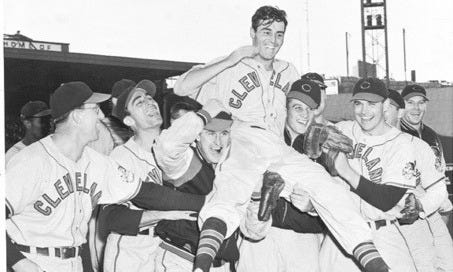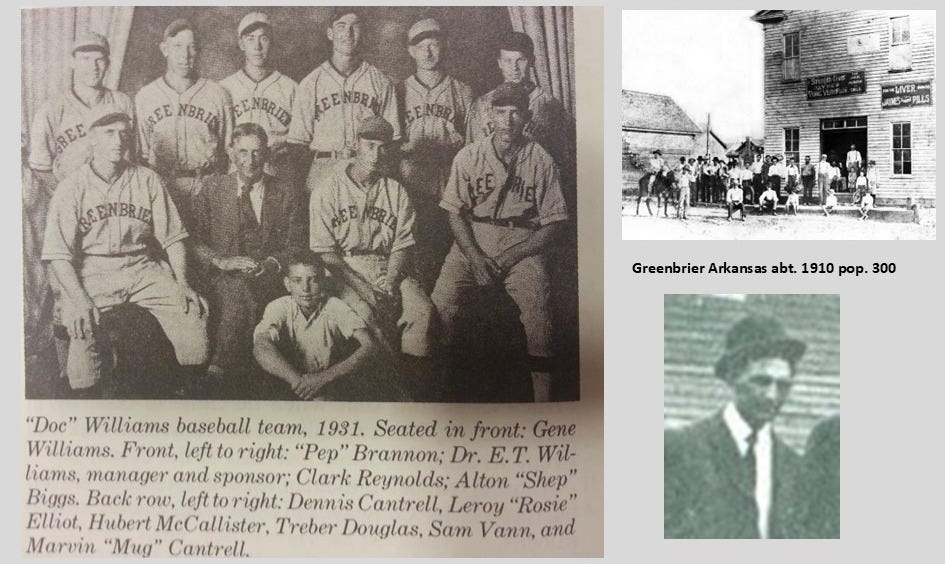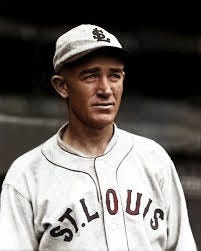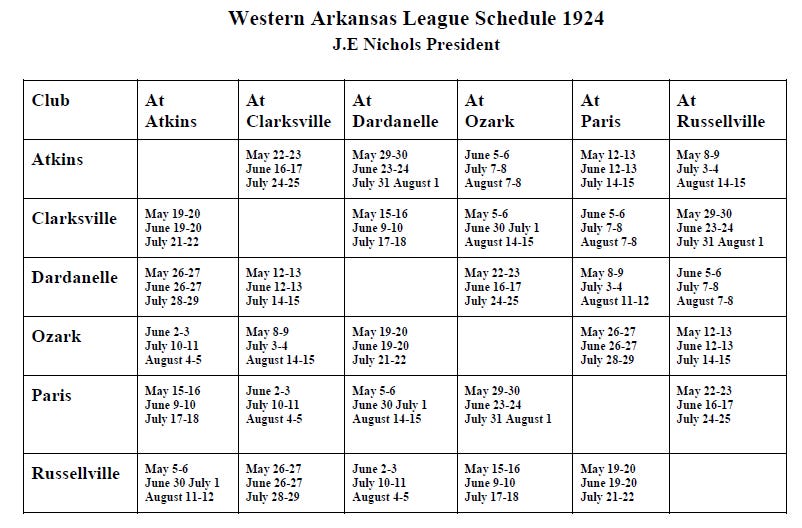Backroads and Ballplayers #75
Stories of the famous and not-so-famous men and women from a time when baseball was "Arkansas' Game." Backroads and Ballplayers Weekly is always free and short enough to read in one cup of coffee.
Lost Stories: Town Teams, Dr. Baseball, Western Arkansas League, and Postseason Fun
Postseason Fun!
As I post this, Game Two of the NLCS is 15 minutes away. The World Series is eleven days away and every game means everything. What a great time to be a baseball fan. Anything can happen and there will be plenty of surprises along the way.
We may see Cleveland win their first World Series since Arkansas’ Gene Bearden was their hero in 1948.
What about a subway series between the two New York teams or the old Yankees vs. Dodgers subway rivalry? Those matchups would certainly get some media attention.
We may see Ohtani vs. Judge or the Polar Bear’s last at-bat with the Mets.
We are sure to see a lot of strikeouts, relief pitchers, and home runs.
It is going to be fun. If you like big swings and unpredictable moments, those are pretty sure things.
If you are hoping for a World Series Champ without a budget the size of the space program, I am afraid that might not happen this time, but it might.
Reflections:
I told you in my post last week to watch out for Lane Thomas. (I wish that was true!)
In the LCS we saw Shohei Ohtani bat .200 and strike out 10 times. Surprisingly those marks were the best of the three superstars.
Aaron Judge batted .154 and fanned five times. He had no RBIs.
Bobby Witt Jr. hit .118. He had two singles in 17 trips to the plate. He struck out five times, walked once, and he also had no RBIs.
AND By the way…
Dodgers pitchers are working on a 33-inning scoreless streak! The Dodgers held the Padres scoreless in the final six innings of NLDS Game Three. They beat the Padres 8-0 and 2-0 in Games 4 and 5, then shut out the Mets 9-0 in Game 1 of the NLCS. The Dodgers accomplished this with a dozen pitchers taking a turn without any member of the group having a bad outing.
Those amazing pitchers did not include Gavin Stone, their leader in innings pitched, or Tyler Glasnow, their representative on the National League All-Star Team.
In alphabetical order, the dominant dozen was Anthony Banda, Ryan Brasier, Walker Buehler, Ben Casparius, Jack Flaherty, Daniel Hudson, Landon Knack, Michael Kopech, Evan Phillips, Blake Treinen, Alex Vesia, and Yoshinobu Yamamoto. AMAZING!
Lost Stories: Town Teams, Dr. Baseball, and The Western Arkansas League
In the spring, I started work on the “town teams” of Arkansas baseball history. It is one of my favorite projects and I will never be able to tell all the colorful tales of the Sunday-pass-the-hat and picnic-on-the-grounds baseball days. Those community baseball games were a much-needed escape during some of our state’s most trying times. During two World Wars, a Great Depression, several devastating floods, a pandemic, and a California migration our grandparent’s Sundays usually involved church and a baseball game. When rural Arkansas needed it most, baseball was there.
First Town Team Game
In the Arkansas Baseball Encyclopedia, Caleb Hardwick gives the designation of the first game between town teams to a well-publicized contest held on Independence Day, 1868. The contest matched a team calling itself the “Rock City Base Ball Club” and a contingent of farmers from Pine Bluff.
The Pine Bluff contingent arrived two days early to immerse themselves in the excitement of the upcoming contest. Newspapers carried the story on the front page, and a shaded seating area was hastily constructed to protect the delicate city folks from the mid-summer sun.
Newspaper coverage of the contest is sparse, but apparently, the two teams battled until both daylight and energy were in short supply, with Rock City eking out a 43–36 victory. In a show of goodwill: “Three cheers were made, as well as a ‘tiger’ for the umpire.”
The Arrival of Dr. Baseball
Dr. Earl T. Williams was born near Hannibal, Missouri, in 1881 and arrived in Greenbrier, Arkansas, to set up his first practice in about 1908. His interest in baseball originated in his youth, and although he did not have the skills to play professional baseball or the time to hone those skills, he possessed a deep love for the game.
By 1913, Dr. Williams had become the coach of the local town team in Greenbrier, and in 1916 he helped establish a semi-pro league called the Faulkner County League. In the early 1920s, Williams’s interests began to change as his involvement in amateur baseball grew. Traditionally, the manager of a semi-pro team found players, scheduled games, and made a lineup. Perhaps influenced by his advanced education, Williams became interested in player development. He continued to look for talent, but Williams took an extra step uncommon in semi-pro baseball. He coached. Williams studied player skills and drilled his players on proper technique. He became what in today’s sports jargon is called “a student of the game.”
The success of Williams’ semi-pro teams did not go unnoticed. Not only was the Greenbrier semi-pro team successful as a unit, but individual players on the team also began to get noticed. As a result, Williams’ players caught the attention of professional baseball scouts, and young men from tiny hamlets in North Faulkner County, Arkansas began signing minor league contracts.
The first of these was Otis Brannan of Greenbrier, who had been an outstanding college baseball player at Arkansas State Normal School (University of Central Arkansas), as well as a star on the Greenbrier semi-pro team. Brannan would become the first player mentored by Dr. Williams to make the major leagues when he became the starting 2nd baseman for the Saint Louis Browns in 1928. He would play professional baseball for 13 seasons.
As I try to tell the story of Arkansas’ town teams, Dr. Williams’ name will continue to be a part of the rich history of semi-pro baseball for the first half of the 20th century. A more complete story of the life of Arkansas “Dr. Baseball” can be found in the March 24, 2021 edition of Only in Arkansas.
The Western Arkansas League Part I
The 100th anniversary of the most ambitious adventure in Arkansas town team history.
1924
The Roaring Twenties had just begun to roar in 1924. The gloomy outlook brought about by the difficult times of the previous decade was fading into the past and an upbeat optimism was sweeping the country. Likewise, America’s Pastime was trying to forget some difficult years and the disappointment of a fixed World Series. A bigger-than-life kid named Ruth from a Baltimore orphanage was the icon of a new era, and major league baseball was energized by the home run. This pervasive fiscal optimism and the rise of baseball’s popularity convinced six small towns in Western Arkansas that they could afford “real” minor league baseball.
In 1924, professional baseball existed in only two larger cities in Arkansas. The Travelers were in Little Rock and members of the Southern Association, and the Fort Smith Twins were part of the Western Association. The six members of the Western Arkansas League Ozark, Clarksville, Paris, Russellville, Atkins, and Dardanelle had a combined population less than Little Rock or Fort Smith.
The WAL had existed as a successful semi-pro league for a number of years. The league was a typical Saturday afternoon, pass-the-hat, organization that took very little commitment from the town's business community. Conversely, minor league baseball with professional players and binding contracts was a major undertaking for the small towns. In February 1924, the leadership of the Western Arkansas League met in Atkins and voted to move forward with the ambitious project. The league would play a 60-game schedule with the champion of the first half of the season playing the winner of the second half for the overall championship.
The most important meeting in the history of the Western Arkansas League was held in Atkins on Friday night of last week. Directors from all the towns composing the league except Ozark were present. After quite a lengthy discussion as to the advisability of going into organized ball the motion passed 4-1. Teams will be restricted to 12 players including the manager and a salary roll of $1,000. Atkins Chronicle 2-29-1924
The fledgling Western Arkansas League would need better players for credibility as a true professional baseball league, and the lack of other minor leagues in the area actually benefitted the league in finding these players. Young men who would rather play baseball than work in the coal mines or on farms often found a place in the WAL when they were released from higher classifications. The league also had some benefactors in positions to help place players with the understanding that they could get them back if needed.
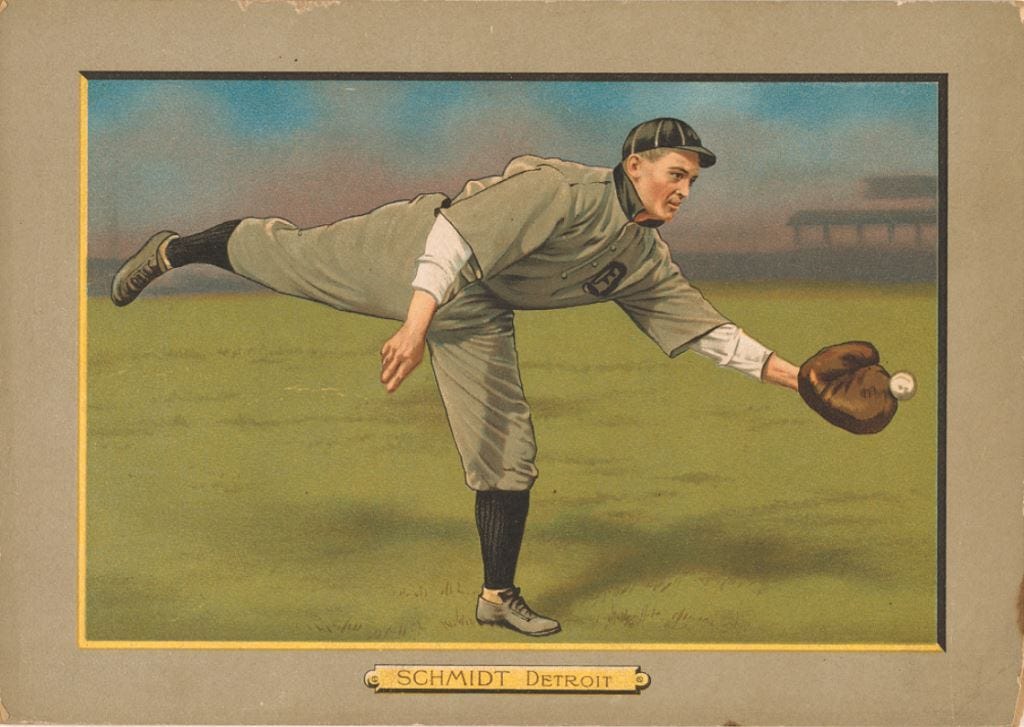
Among these baseball men with players to farm was Charles “Boss” Schmidt, manager of the Springfield Midgets in the Western Association. Schmidt was born in London, Arkansas, and grew up in the coal mining region of West Central Arkansas. As he trimmed his roster in the spring of 1924, he often attempted to place the players he thought had potential with his friends in the Western Arkansas League. Blake Harper, general manager of the Fort Smith Twins and a friend of several WAL leaders, likewise placed players in the new league.
Another player resource resulted from a quirk in the rules on college students playing summer baseball for pay and retaining their eligibility. The Arkansas College Athletic Association ruled that college players could play for pay in the Western Arkansas League and remain eligible for their college teams. The WAL found many of its stars as colleges closed for the summer and outstanding college players found work as pro baseball players. The Dardanelle White Sox took early advantage of the ruling by signing future major leaguer Carey Selph and Yell County native Walter Jacoway when the spring term ended at Ouachita Baptist College. Both would be instrumental in the Dardanelle team’s early success.
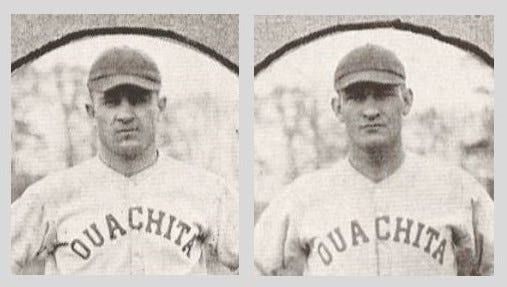
The Western Arkansas League kicked off its schedule the week of May 5, 1924, with games between teams of geographic proximity. Pope County rivals Russellville and Atkins met in Atkins. The two “south of the river” teams, Dardanelle and Paris, met in Dardanelle, and Ozark and Clarksville opened the campaign in Ozark. Opening day was an exciting day in the small towns of the WAL.
Western Arkansas League 1924
Atkins Boys - Manager Wilson Daniel
Clarksville Reds - Manager Albert “Red” Basham
Dardanelle White Sox - Manager Buddy Hodges, Dan Shoffner
Ozark Bears - Manager Virgil “Red” Day
Paris Blues - Manager Bobby Kling, Jimmy Boen
Russellville Miners - Manager Ed “Cabin” Cowan, Jimmy Johnson, “Red” Day
With but few exceptions the businesses houses of this town closed Monday afternoon in order that all might witness the opening of the Western Arkansas League, the Paris club being the visiting contender for the occasion…As a mark of courtesy and goodwill, thirty –one automobiles met the train from Paris and conveyed the team and a large delegation of fans to the ballpark. Dardanelle Post-Dispatch 5-8-1924
Russellville was on the road at Atkins on opening day, but that did not diminish the festivities when the Russellville Miners played their first home game later that week at the Second District Agricultural School’s home field. (ATU)
A parade headed by the band and both teams will lead Russellville fans to Buerkle Field at 2:00. The stores will close this afternoon in keeping with the agreement to close every Thursday afternoon…and with no business or other things to interfere with baseball, one of the largest crowds ever seen at Buerkle Field is expected. Russellville Courier Democrat 5-8-1924
Clarksville finished the first week with four victories and no losses. Dardanelle was 3 -1, and after splitting the opening two games of the season with Atkins, Russellville swept the two games at Buerkle Field. The Russellville Courier Democrat was flush with optimism.
Manager Cowan has brought together a real baseball team according to the opinion of fans who saw them play four games on the home grounds since our last issue and if the fans will fatten the gate receipts a little and support the team in every way, Russellville will be in the first division fighting some team for a pennant. Russellville Courier Democrat 8-15-1924
The Western Arkansas League was off to a good start.
Western Arkansas League Part II next week. A battle for the Championship!
Book ordering information: Link
Welcome new subscribers. Have you missed some posts? Link - https://jyeager.substack.com/

